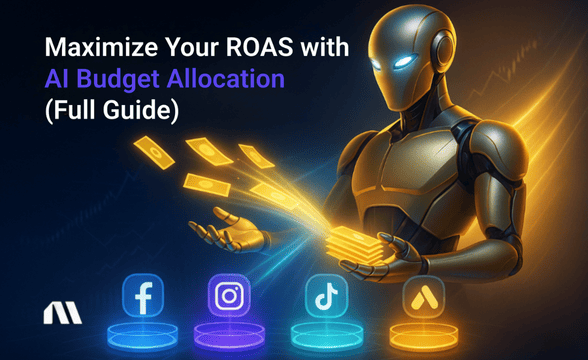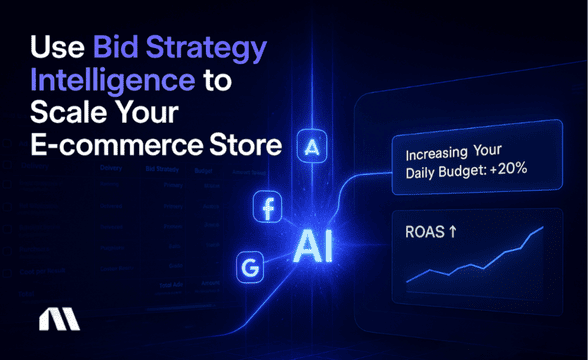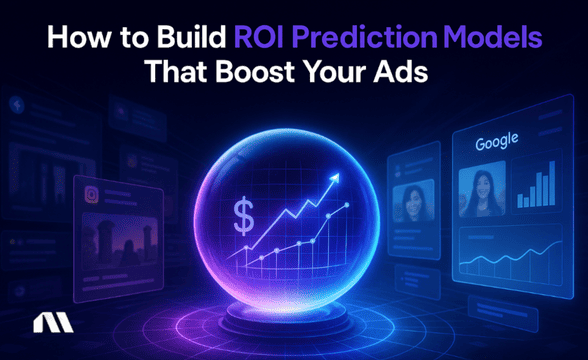Learn how budget optimization agents can boost campaign ROI. Complete with implementation strategies, performance benchmarks, and AI-powered allocation tips.
Picture this: You're managing 15 campaigns across Facebook, Instagram, and Google Ads. Campaign A is crushing it with a 4.2 ROAS, while Campaign B is bleeding money at 0.8 ROAS.
By the time you notice and manually shift budgets, you've already lost $3,000 in potential profit. Sound familiar?
This scenario plays out thousands of times daily for performance marketers. Traditional budget management relies on weekly reviews and manual adjustments - but in today's fast-moving digital landscape, that's like trying to steer a race car while looking in the rearview mirror.
According to recent industry data, real-time budget reallocation has been shown to enhance ROI by up to 25% in some cases when properly implemented.
Budget optimization agents are AI-powered systems that help manage and distribute marketing budgets across advertising channels with automated recommendations. They use machine learning to analyze performance data and suggest budget allocation decisions designed to maximize ROI.
Instead of waiting for your weekly budget review, these agents monitor campaign performance 24/7 and provide recommendations for budget redistribution within minutes of detecting performance shifts.
What You'll Learn
- How budget optimization agents work and integrate with your existing campaigns
- Step-by-step implementation process with realistic timelines and expectations
- Advanced optimization strategies for cross-platform budget management
- Performance benchmarks and ROI calculation frameworks
- Bonus: Common implementation pitfalls and how to avoid them
What Are Budget Optimization Agents?
Let's cut through the marketing fluff and get technical. Budget optimization agents are machine learning systems that continuously analyze campaign performance metrics and provide automated recommendations for redistributing advertising spend to optimize for your target KPIs.
Here's what makes them different from your current setup: while you're checking campaign performance once or twice daily, these agents are analyzing performance data every 15 minutes and suggesting micro-adjustments that can compound into significant ROI improvements.
Core Components of Budget Optimization Agents
- Performance Monitoring Engine: Tracks real-time metrics across all connected advertising platforms. This isn't just pulling basic metrics like spend and impressions - we're talking about conversion velocity, audience saturation signals, and competitive pressure indicators.
- Allocation Algorithm: Uses historical performance data and predictive modeling to determine optimal budget distribution recommendations. The sophisticated algorithms consider dozens of variables simultaneously, from time-of-day performance patterns to seasonal trends.
- Execution Layer: Provides automated budget adjustment recommendations through platform integrations. This is where the value happens - instead of you logging into five different platforms to analyze budget needs, the agent provides consolidated recommendations through a single interface.
- Attribution Integration: Connects budget recommendations to actual conversion outcomes. This is crucial because it ensures budget suggestions are based on real business results, not just platform-reported metrics.
How They Differ from Platform Native Tools
Unlike Facebook's Campaign Budget Optimization or Google's Shared Budgets, dedicated budget optimization agents work across platforms and use more sophisticated attribution models.
Facebook's CBO only optimizes within Facebook campaigns, while an advanced budget optimization agent can recommend shifting spend from an underperforming Facebook campaign to a high-performing Google Ads campaign.
Research shows that forecasting accuracy improves by 33% when using cross-platform optimization compared to single-platform tools. That's the difference between reactive and predictive budget management.
The Science Behind AI Budget Allocation
The magic happens in the algorithm. Modern budget optimization agents use ensemble machine learning models that consider dozens of variables simultaneously.
Think of it as having a team of data scientists analyzing your campaigns 24/7, providing expert recommendations without the salary overhead.
Key Performance Indicators Analyzed
Real-time ROAS and conversion rates: Not just yesterday's performance, but trending patterns and velocity changes. The agent identifies when a campaign's performance is accelerating or declining before it becomes obvious in your dashboard.
Cost per acquisition trends: Understanding whether your CPA is rising due to audience fatigue, increased competition, or seasonal factors. This context determines whether to recommend budget reductions or pushing through temporary efficiency dips.
Audience saturation signals: Advanced agents monitor frequency caps and audience overlap to help prevent budget waste on oversaturated audiences. When your Facebook bid strategy starts showing saturation signals, the agent can recommend exploring new audience segments.
Competitive landscape changes: Monitoring when competitors increase their ad spend in your target markets and suggesting budget adjustments accordingly. This is particularly crucial during high-competition periods like Black Friday or product launches.
Seasonal performance patterns: Learning from historical data to predict and prepare for seasonal fluctuations. Instead of being surprised by Q4 performance changes, the agent anticipates and suggests budget adjustments proactively.
Machine Learning Model Types
Most sophisticated agents use ensemble models combining:
- Gradient boosting for performance prediction
- Neural networks for pattern recognition
- Time series analysis for seasonal adjustments
- Reinforcement learning for optimization strategy refinement
The key is that these models learn from your specific account data, not just industry averages. Your budget optimization agent becomes smarter about your business over time.
Pro Tip: Look for agents that use at least 3 different model types in their ensemble. Single-model systems are more prone to optimization blind spots and can miss important performance patterns.
Cross-Platform Integration Strategies
Here's where most marketers struggle - getting all your platforms talking to each other. Budget optimization agents solve this through unified API integration, but the setup requires strategic thinking about platform hierarchy and data flow.
Platform Integration Hierarchy
Primary Platforms: Facebook/Instagram, Google Ads (highest budget allocation)
These platforms typically receive 60-80% of your total budget and have the most sophisticated optimization capabilities. Your agent should have deep integration here, including access to conversion data, audience insights, and performance recommendations.
Secondary Platforms: TikTok, LinkedIn, Twitter (performance-based allocation)
These platforms receive 15-30% of budget based on performance. The key is setting up proper attribution tracking so the agent can accurately compare performance across platforms.
Testing Platforms: Emerging channels (limited budget allocation)
Reserve 5-10% of budget for testing new platforms or ad formats. The agent should provide recommendations for graduating successful tests to secondary platform status.
Attribution Model Integration
Most budget optimization agents use last-click attribution by default, but sophisticated marketers need multi-touch attribution integration. This is where spend optimization algorithms become crucial - they help determine which touchpoints deserve budget credit.
The challenge is that different platforms report attribution differently. Facebook uses a 28-day click, 1-day view window by default, while Google Ads uses a 30-day click window. Your budget optimization agent needs to normalize these differences for accurate cross-platform comparison.
Pro Tip: Set up server-side conversion tracking before implementing budget optimization agents. This gives you a unified source of truth for attribution that isn't dependent on platform-specific tracking methods.
Implementation Roadmap (30-60-90 Day Plan)
Days 1-30: Foundation Setup
Week 1: Account Connection and Verification
- Connect advertising accounts and verify API permissions
- Set up conversion tracking and attribution models
- Establish baseline performance metrics for comparison
- Configure initial safety limits (maximum daily spend, minimum ROAS thresholds)
Week 2: Initial Rule Configuration
- Begin with 20% of total budget for testing recommendations
- Set up basic optimization rules (flag campaigns below 0.5 ROAS, highlight campaigns above 3.0 ROAS)
- Configure alert systems for significant performance changes
- Test recommendation systems with small budget adjustments
Week 3-4: Data Collection and Analysis
- Monitor agent recommendations against manual management decisions
- Collect baseline data on optimization frequency and impact
- Identify any platform-specific integration issues
- Fine-tune safety parameters based on initial results
Days 31-60: Optimization Refinement
Week 5-6: Algorithm Training
- Analyze initial performance data and adjust algorithms
- Expand to implementing 50% of budget recommendations
- Implement more sophisticated optimization rules based on learned patterns
- Begin cross-platform budget shifting recommendations
Week 7-8: Attribution Integration
- Implement cross-platform attribution tracking
- Connect budget recommendations to actual conversion outcomes
- Set up automated reporting and performance alerts
- Test advanced optimization strategies like dayparting and audience-based allocation
Days 61-90: Full Deployment
Week 9-10: Scale to Full Management
- Scale to implementing 80-90% of agent recommendations
- Implement advanced optimization strategies
- Establish performance benchmarks and success metrics
- Create optimization playbooks for different scenarios (product launches, seasonal campaigns, competitive responses)
Week 11-12: Performance Optimization
- Fine-tune algorithms based on full-scale performance data
- Implement advanced features like predictive budget allocation
- Set up long-term performance tracking and ROI measurement
- Document best practices and optimization strategies
Advanced Optimization Strategies
Performance-Based Reallocation Rules
Aggressive Growth Rules:
- Recommend budget increases of 20% for campaigns exceeding target ROAS by 15%
- Suggest doubling budgets for campaigns with conversion rates 50% above account average
- Recommend shifting 30% of budget from underperforming campaigns to top performers within 24 hours
Conservative Protection Rules:
- Suggest budget decreases of 30% for campaigns underperforming by 20%
- Recommend pausing campaigns with conversion rates below 50% of account average
- Implement gradual budget increase recommendations (10% daily) for new high-performing campaigns
Seasonal Adjustment Rules:
- Recommend budget increases of 40% during historically high-performing periods
- Suggest budget reductions of 25% during known low-performance windows
- Implement weekend vs. weekday budget allocation based on historical data
Advanced Attribution Strategies
The real power comes from connecting budget recommendations to actual business outcomes. This means going beyond platform-reported conversions to track lifetime value, repeat purchase rates, and customer acquisition costs.
For e-commerce businesses, this might mean prioritizing budget allocation recommendations for campaigns that drive customers with higher average order values, even if the immediate ROAS appears lower. For SaaS companies, it means optimizing recommendations for trial-to-paid conversion rates rather than just trial signups.
Pro Tip: Set up cohort analysis tracking to measure the long-term value of customers acquired through different campaigns. This data helps your budget optimization agent make smarter allocation decisions based on customer lifetime value, not just immediate conversions.
ROI Measurement and Performance Benchmarks
Key Metrics to Track
Budget Utilization Efficiency (target: 95%+)
This measures how effectively you implement agent recommendations. Under-implementation suggests overly conservative approaches, while over-implementation might indicate insufficient safety limits.
Cross-Platform ROAS Improvement (benchmark: 15-25%)
Compare your overall ROAS before and after implementing budget optimization agent recommendations. Industry data shows that marketing automation delivers an average ROI of 544%, with $5.44 returned for every $1 spent on automation tools.
Time to Optimization (target: <24 hours)
How quickly does your agent identify and recommend responses to performance changes? The best agents detect significant performance shifts within 15-30 minutes and provide budget adjustment recommendations within 1-2 hours.
Manual Intervention Reduction (target: 80%+)
Track how much time you're saving on manual budget analysis. The goal is to reduce manual budget review time by at least 80% while maintaining or improving performance through AI recommendations.
ROI Calculation Framework
Direct ROI Calculation:
ROI Improvement = (Post-Agent ROAS - Pre-Agent ROAS) / Pre-Agent ROAS × 100
Time-Adjusted ROI:
Factor in the time saved on manual management. If you're saving 10 hours per week on budget analysis, calculate the value of that time and add it to your ROI calculation.
Compound ROI Benefits:
Consider the compounding effect of faster optimization recommendations. Money saved from poor-performing campaigns in week 1 can be reinvested for additional returns in week 2.
When evaluating budget efficiency analysis, remember that the goal isn't just cost savings - it's revenue optimization. A good budget optimization agent should help you identify opportunities to spend more money profitably, not just spend less money.
Common Implementation Challenges and Solutions
Challenge 1: Platform API Limitations
Some platforms restrict budget adjustment frequency. Facebook allows budget changes every 15 minutes, but some smaller platforms might limit changes to once per hour or even daily.
Solution: Implement buffer strategies and batch optimization windows. Instead of recommending constant micro-adjustments, accumulate optimization signals and suggest larger, less frequent adjustments on restricted platforms.
Challenge 2: Attribution Discrepancies
Different platforms report conversions differently, making cross-platform optimization challenging. Google Ads might show 100 conversions while Facebook shows 150 for the same campaign period.
Solution: Implement server-side tracking and use a unified attribution model. Tools like Madgicx's Cloud Tracking help normalize attribution across platforms for more accurate budget allocation recommendations.
Challenge 3: Learning Period Disruption
Frequent budget changes can disrupt platform learning algorithms, particularly on Facebook where the algorithm needs stable conditions to optimize effectively.
Solution: Implement minimum learning period rules. Avoid recommending budget adjustments during the first 48-72 hours of a new campaign, and avoid suggesting changes larger than 20% during active learning periods.
Challenge 4: Seasonal Performance Variations
Budget optimization agents might overreact to seasonal performance changes, recommending budget cuts during temporary dips or over-investing during short-term spikes.
Solution: Incorporate historical seasonal data into optimization algorithms. Train your agent to recognize normal seasonal patterns and adjust recommendation sensitivity accordingly.
Pro Tip: Create separate optimization rules for different business cycles. Black Friday optimization should be more aggressive than January optimization, when most businesses see natural performance dips.
Industry Adoption and Future Trends
Currently, 29.3% of businesses are using AI for budget optimization in 2024, representing a 40% increase from the previous year. This adoption rate is accelerating as marketers realize the competitive advantage of real-time optimization insights.
The future of budget optimization agents includes:
- Predictive budget allocation based on market conditions and competitor activity
- Cross-channel customer journey optimization that considers the full conversion path
- Dynamic creative optimization integrated with budget allocation recommendations
- Voice and conversational AI interfaces for easier agent management
Early adopters are seeing significant advantages. Companies implementing AI-powered budget optimization report an average ROI improvement of up to 300% from their marketing integration efforts.
Frequently Asked Questions
How quickly do budget optimization agents provide recommendations?
Most agents can detect performance changes within 15-30 minutes and provide budget adjustment recommendations within 1-2 hours, compared to manual reviews that typically happen weekly. However, the speed depends on platform API limitations and your safety settings.
What's the minimum ad spend needed for effective budget optimization?
You need at least $1,000/month per platform for meaningful optimization recommendations. Below this threshold, there isn't enough data for reliable algorithmic insights. For cross-platform optimization, we recommend a minimum total spend of $5,000/month.
Can budget optimization agents work with custom attribution models?
Advanced agents like Madgicx's AI Marketer integrate with custom attribution models, but setup requires technical configuration and may need developer assistance. The investment is worthwhile for businesses with complex customer journeys.
How do I prevent budget optimization agents from recommending overspending?
Always set hard spending limits and implement safety rules. Most agents allow you to set maximum daily/weekly spend limits that override algorithmic recommendations. Start conservative and gradually increase limits as you build confidence in the recommendations.
What happens if the AI provides poor budget allocation recommendations?
Quality agents include performance tracking and manual override capabilities. You can also set performance thresholds that trigger automatic alerts. The key is maintaining human oversight, especially during the first 90 days of implementation.
How do budget optimization agents handle new campaign launches?
Most agents have special rules for new campaigns, typically excluding them from optimization recommendations for 48-72 hours to allow platform algorithms to establish baseline performance. After this learning period, they're gradually integrated into the recommendation system.
Can I use budget optimization agents with existing campaign structures?
Yes, but you might need to restructure campaigns for optimal performance. Agents work best with simplified campaign structures that allow for easy budget shifting between ad sets and campaigns.
Start Optimizing Your Budgets Today
Budget optimization agents represent the evolution from reactive to proactive campaign management. Instead of discovering performance issues in weekly reports, you're identifying them in real-time with AI-powered recommendations.
The three key takeaways: implement gradually with safety limits, focus on cross-platform integration for maximum impact, and measure success through ROI improvement rather than just cost savings.
Remember that Facebook campaign ROI optimization is just one piece of the puzzle - true success comes from holistic cross-platform optimization insights.
The data is clear: businesses using AI for budget optimization are seeing significant competitive advantages. With Facebook ads cost continuing to rise across most industries, automated optimization recommendations aren't just a nice-to-have - they're becoming essential for maintaining profitable growth.
Ready to reduce time spent on manual budget management? Madgicx's AI Marketer has helped performance marketers achieve better ROI through intelligent budget optimization recommendations. The platform integrates with your existing campaigns and starts providing optimization insights within 24 hours, using the same advanced algorithms that power enterprise-level optimization strategies.
Next step: Start with a free trial and connect your top-performing campaign. You'll see optimization recommendations within the first day, and full budget optimization capabilities within the first week.
Reduce time spent on manual budget management delays. Madgicx's AI Marketer continuously monitors your Meta campaigns and provides AI-powered recommendations for reallocating budgets to your highest-performing ads. Get the same optimization insights that helped our clients achieve better ROI through intelligent automation.
Digital copywriter with a passion for sculpting words that resonate in a digital age.







.avif)







